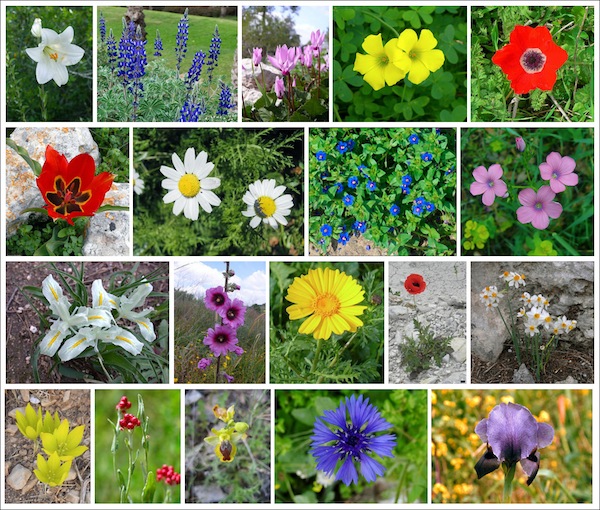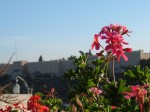A collage of Israeli wildflowers. (MathKnight/Wikimedia Commons)
Every year, spring returns like a miracle and Israel is carpeted with wildflowers. There are nearly 3,000 types of wild plants in this tiny land, a wonderful profusion – among the most abundant on earth, growing in deserts and marshes, mountains and forests, and open fields.
We protect the wildflowers in Israel. Nature reserves prohibit picking any flowers, even the most common, which helps them propagate over wider areas. In turn, this brings the sunbirds, who feast on their nectar.
The Song of Songs, which we read every Passover, is the most beautiful love poem in the world. King Solomon wrote it as a dialogue between a young shepherd and his beloved: “Rise up, my love, my fair one and come away / For lo, the winter is past / The rain is over and gone / The flowers appear on the earth / The time of singing is come / And the voice of the turtle is heard in the land.”
The flowers he refers to, nitzanim, still carpet the fields – red poppies flaunting scarlet beauty in the grass.
In the Jerusalem Forest, cyclamens bloom in the crevices between the rocks. Called “Solomon’s Crown” in Hebrew, they lift their pink, cream or lilac heads on slender stalks. Clumps of wild violets, the dew shimmering, add their touch of magic.
We had good rains this winter and they have left a bequest of green. The Sharon Valley is dotted with tulips and narcissus – “I am the Rose of Sharon, a lily of the valleys.”
It is believed that King Solomon was referring to the black tulips of the Galilee. In spring, even the weeds are beautiful – the milk vetch (gadilan), which is just a common thistle, adds purple blooms to the roadside. The rock rose (labdanum) flowers abundantly in forest glades, and the orange ranunculus bursts forth. Like its velvety cousin, the anemone, it is a protected wild flower in Israel.
The perfume of daffodils, which delighted our winter, still wafts on the breeze, and the white, cream, yellow and blue noses of lupins are pushing through the soil. Oleanders are in bud, growing wild by the banks of the River Jordan and near streams in Galilee, promising summer. And the blue statice reminds us that we, too, have a Mediterranean coast like the famed Riviera – this sea plant flowers from spring until mid-summer, when its corolla drops off and only the sepal remains.
When you see the splendour of the land’s spring glory, the wildflowers glowing, you’ll echo the poet’s words: “Had I but two loaves of bread, I would sell one of them and buy white hyacinths to feed my soul.”
Dvora Waysman is a Jerusalem-based author. She has written 14 books, including The Pomegranate Pendant, which was made into a movie, and her latest novella, Searching for Sarah. She can be contacted at dwaysman@gmail.com or through her blog dvorawaysman.com.


